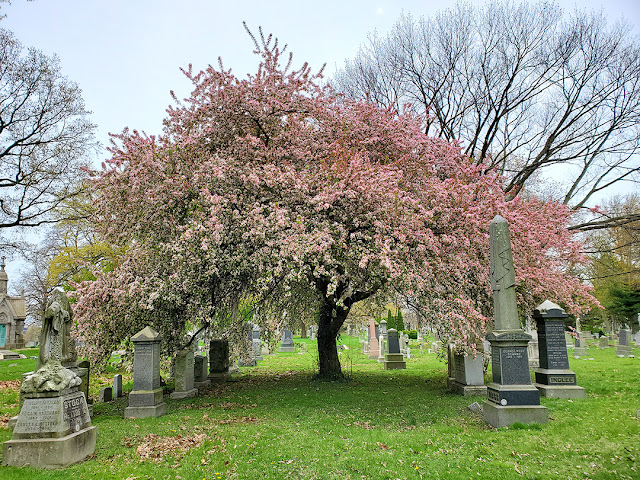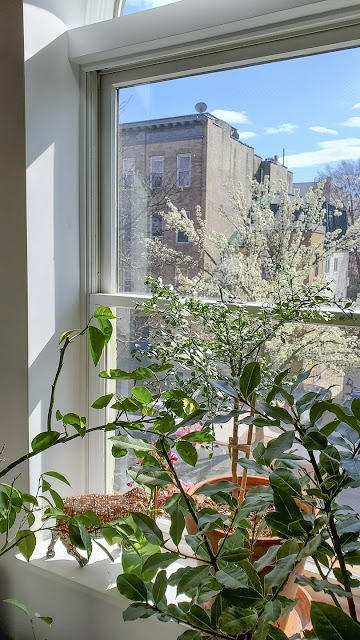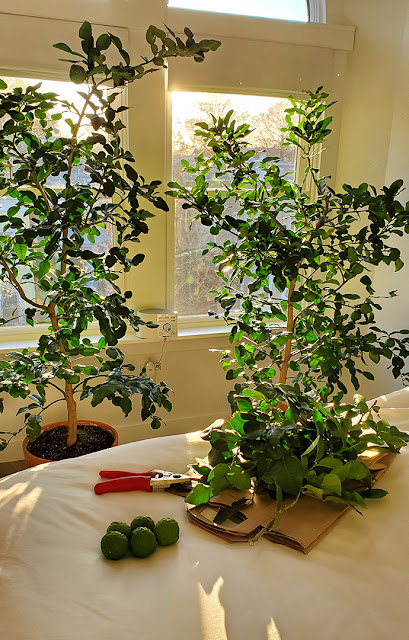Betty Scholtz has died. A tree crashing in the spring woods.
Director Emeritus of the Brooklyn Botanic Garden. Dear Betty.
Tomorrow would have been her 99th birthday. Nine years ago I sat with her at her birthday lunch in the beautiful New Jersey garden of her good friends Graeme Hardie and Silas Mountsier. I wrote about her then for The Cape Argus, a Cape Town newspaper (Betty was South African).
Betty was a mighty woman. In spirit and in stature. Taller than I am (that's five eleven and a bit) and always dressed in tropical brightness, like a butterfly. A stoic and private butterfly, often amused, generous, and interested in other people. And stubborn. She always called me Mah-ree, refusing to believe that someone with a name as Afrikaans as mine could possibly pronounce the name differently. You didn't argue with Betty.
Lekker slaap, Betty. Maybe you are playing cards with Leipoldt again. I like to think so.
In case that is hard to read:
“I ate lion with Leipoldt,” Betty Scholtz told me last summer, as we ate lunch at the Brooklyn Botanic Garden.
“What did it taste like?” I asked.
“Gamey,” she said. “He told us the best thing he’d ever eaten was baby doormouse, dipped in honey...” And then she added, “He made me cry.”
Elizabeth Scholtz is the director emeritus of New York City’s Brooklyn Botanic Garden (BBG). On April 29th, she celebrated her 90th birthday.
The recent addition of a walking stick to her movements irks the independent woman - Miss Scholtz still goes to work every day. She deals with the symptoms of age impatiently and with audible frustration, and is quick to remind one that her oldest friend - literally - Esther “Faity” Tuttle, turns 100 this year. Mrs Tuttle was recently featured in Shape Magazine, wearing a leotard. The bar, Miss Scholtz feels, has been set rather high.
Elizabeth Scholtz was born in Pretoria in 1921. Describing her South African childhood, and considering her current attitude to life, she says that whenever she presented herself to her physician father with an ache or a pain, he made her repeat, three times, “Hell, I am well!” and that after she and her brothers were born, all at home, friends visiting their new mother with “invalid port” would be surprised to find the invalid outside playing tennis, or busy gardening.
Dr Scholtz died suddenly in 1932 of septicemia. “My mother gave us loving care, but not tender loving care. She was a widow, and had to be tough.”
Miss Scholtz’s mother remarried and holidays were later spent at her stepfather’s bush camp on the edge of the Kruger National Park, where Leipoldt would become a guest. Sixteen years old and precociously enrolled at Wits, Miss Scholtz majored in botany and zoology, writing her thesis on the bushveld trees she had grown to love over tented weekends. Her dream to pursue post graduate studies was nixed by her mother, for whom the vagaries of war and the cost of her sons’ education made it impossible. Betty went to work at 20, becoming a medical technician specializing in haematology. She moved to Cape Town and lived and worked there for nearly 20 “very social” years. Weekends were spent botanizing with doctor friends and their wives in Dutoitskloof and Betty’s Bay.
After a stint at the Beth Israel Hospital in Boston in 1957, Miss Scholtz moved to New York in 1960 to take up a post in the Adult Education Department of the BBG. Twelve years later she was appointed director of the garden, becoming the first female director of a major American botanic garden. She served as director until 1980 and retired officially in 1987. She continued to serve as director emeritus and to lead the BBG’s international garden tours - amassing 100 tours in 46 countries. In 1988 a grandiflora rose was named after her. She has received numerous awards to honour her contribution to horticulture, including American horticulture’s highest award, the Liberty Hyde Bailey Medal from the American Horticulture Society and the United Kingdom’s Veitch Memorial Medal from the Royal Horticultural Society. She has been a mentor to what the BBG describes as “generations of North American public garden professionals.” She is a living resource of botanical and horticultural knowledge and a font of anecdotes told in an unchanged and beautifully modulated South African accent, with a ready laugh. A stream of visitors to the BBG makes its way to her book-lined office, which is how I met her, two years ago.
At a lunch in honour of her 90th birthday, given by her friends Silas Mountsier and Graeme Hardie in Mr Mountsier’s leafy spring garden in Nutley, New Jersey, Betty protested at gifts, exclaimed over packets of honey bush tea, and worried about keeping the driver who had brought her out from New York, waiting. But Mr Hardie, a former Capetonian, who had prepared and served the meal, was still passing around local cheese and green fig preserve brought back from a recent trip to Cape Town. “Green figs!” Miss Scholtz’s eyes lit up. Dressed in mandarin red, her socially charged day was still young. This long lunch would be followed by celebratory drinks at Mrs Tuttle’s, and then a Broadway play. She may have preferred a quieter day, but the strength of her personality and humour, her interest in the lives of others and her commitment to gardens near and far, have created many admirers whose understandable wish is to celebrate a life that seems to burn more brightly than most.
“Why did Leipoldt make you cry? “ I asked last summer, thinking of the pink doormice sliding down the knowledgeable throat of the poet, writer, raconteur, gourmand, cook, and medical doctor.
“I beat him at bridge,” she said, “and I don’t think he liked that very much.”
_________________









